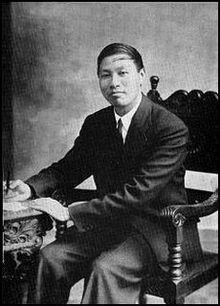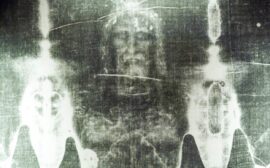The following excerpt is from an academic paper by Brian Chilton titled “The Impact of Watchman Nee’s Pneumatology.”
Watchman Nee was a profound individual. Western theologians have often had a profound impact on the history and theology of the Christian church rather than Majority World Christians. However, as Archie Hui notes, Watchman Nee “has the rare distinction that his influence is felt not only among the Chinese, but also in the world at large.”[1] What is it that makes Nee so influential? What has Nee contributed to the global church? The answer to both questions resides in Watchman Nee’s pneumatology. Pneumatology refers to the doctrine of the Holy Spirit. Watchman Nee’s pneumatology left an indelible impression upon the global church. What were the distinctives of Nee’s pneumatology? How did Nee transform the church of his day? What can modern Western Christians learn from Nee’s example? These questions will be addressed in this paper.
Thus, this paper will demonstrate that Nee’s pneumatology provided great impact for the House Church Movement in China. To demonstrate the impact of Nee’s pneumatology, the paper will first provide a brief biography of Watchman Nee. Then, the paper will examine the distinctives of Nee’s pneumatology. Next, the paper will observe how Nee’s theology influenced the Chinese House Church movement. Finally, the paper will seek to address how Nee’s pneumatology can help Western Christians as they face a culture that is becoming more and more anti-Christian in its outlook. Before engaging with Nee’s theology, one must first understand Watchman Nee.
Biography of Watchman Nee
Watchman Nee’s real name was “Nee Tao Shu.”[2] Erling notes that Nee was born “November 4, 1903 in Swatow, Kwantung Province.”[3] Both Nee’s father, Ni Weng-hsiu, and mother, Huo-ping, were Christians. Nee would accept Christ as a teenager. During his educational career, Nee, as Erling denotes, was “educated both in the Chinese classics and the Bible.”[4] During Nee’s Christian education, he “was greatly influenced by Margaret Barber, an English missionary who introduced him to the writings of Jessie Penn-Lewis, D. M. Panton, and J. N. Darby.”[5] Barber was an Anglican missionary and had a great impact on Nee’s life. John Darby, also an Anglican, is known for his work in the dispensational movement. Nee’s association with the London Brethren would lead him into a strong complementarian stance on women in leadership. As Erling notes, Nee placed “restrictions on women in his group. They were to wear headgear in church… [and] he argued that women should not engage in public preaching, except to other women.”[6] Other ecclesiastical issues also troubled Nee.
Nee was troubled by the secularism and great compromising nature of the churches of his time. Nee writes that “It is a historic fact that in Christ my old man was crucified, and it is a present fact that I am blessed…but if I do not live in the Spirit, then my life may be quite a contradiction of the fact that I am in Christ, for what is true of me in Him is not expressed in me.”[7] Thus, Nee called for a spiritual reform of sorts. He called for a life that was focused and centered upon living a life directed by the Holy Spirit. The details of Nee’s pneumatology will be listed in the forthcoming section. Before one can understand the impact that Nee has made upon the persecuted church, one must first understand the persecution that Nee endured.
When Nee returned to China, he began a pharmaceutical company. A few years after the establishment of the People’s Republic of China, the government pressured Nee and his congregants to join the “government-led Three Self Reform Movement (self-governing, self-supporting, self-propagating).”[8] Nee, as well as his wife Charity, were falsely charged and imprisoned by the Communist Chinese government. In part, Lee notes that the “proliferation of the Little Flock congregations and their religious activism revealed the failure of the Maoist state to exercise absolute control in the religious sphere.”[9] Nee suffered greatly during his time in prison. Erling notes that in the “Cultural Revolution of 1966 Red Guards broke into the Shanghai prison, and there is evidence that in this episode Nee was violently molested and suffered a fractured arm.”[10] Despite his sufferings, Nee remained steadfast in his dependence upon the Holy Spirit.
Part of the reason that the Communist Chinese government sought to imprison Nee was because of Nee and his congregants’ ecclesiastical viewpoints, which derived from Nee’s strong pneumatology. Their ecclesiology did not imbibe in political infrastructures, but was rather focused primarily on the kingdom of God. Joseph Tse-Hei Lee explains,
Because the Little Flock was Chinese in origin and a truly Three-Self Christian movement, Watchman Nee and his followers refused to be subject to the control of the Maoist state. They strongly believed that they were called out of this world to follow and serve Jesus Christ and that they could exist outside of politics yet coexist with the Communist government in the post-1949 era.[11]
While Nee and the Little Flock were involved in political activism, perhaps it was the views held by Nee and the Little Flock that challenged the power that the communist government sought to enforce. Unfortunately, Nee was never released from prison. Not much is known about Nee’s death outside of the fact that Nee died while still imprisoned. Erling notes that Nee “appears to have been moved from the Shanghai prison to a rural work camp. A letter written in April 1972 refers to his chronic heart condition, from which he does not expect to recover, but also to his continuing joy.”[12] Whatever one makes of Nee’s theology, one must acknowledge the great faith that Nee maintained while suffering for Christ. What were the core distinctives of Watchman Nee’s pneumatological belief structure? The forthcoming section will investigate Nee’s pneumatology.
Next week, we will examine the distinctives of Watchman Nee’s pneumatology.
© January 7, 2016. Brian Chilton.
Bibliography
Adeney, D. “Nee, Watchman,” Who’s Who in Christian History. Edited by J.D. Douglas and Philip W. Comfort. Wheaton: Tyndale House, 1992.
Erling, Bernhard. “Story of Watchman Nee.” Lutheran Quarterly 28, 2 (May 1976): 140-155. Accessed November 20, 2015. ATLA Religion Database with ATLASerials, EBSCOhost.
Geisler, Norman L. Chosen But Free: A Balanced View of God’s Sovereignty and Free Will. Third Edition. Minneapolis: Bethany House, 2010.
_______________. Systematic Theology: In One Volume. Minneapolis: Bethany House, 2011.
Hui, Archie. “The Pneumatology of Watchman Nee: a New Testament Perspective.” The Evangelical Quarterly 76, 1 (January 2004): 3-29. Accessed November 20, 2015. ATLA Religion Database with ATLASerials, EBSCOhost.
Lee, Joseph Tse-Hei. “Watchman Nee and the Little Flock movement in Maoist China.” Church History 74, 1 (March 2005): 68-96. Accessed November 20, 2015. ATLA Religion Database with ATLASerials, EBSCOhost.
Nee, Watchman. Sit, Walk, Stand. Carol Stream: Tyndale House, 1977.
_____________. The Normal Christian Life. Fort Washington, PA: Christian Literature Crusade, 1980.
_____________. The Spiritual Man: In Three Volumes. New York: Christian Fellowship Publishers, Inc., 1968.
Tennent, Timothy C. Theology in the Context of World Christianity. Grand Rapids: Zondervan, 2007.
Endnotes
[1] Archie Hui, “The Pneumatology of Watchman Nee: a New Testament Perspective,” The Evangelical Quarterly 76, 1 (January 2004): 3, retrieved November 20, 2015.
[2] D. Adeney, “Nee, Watchman,” Who’s Who in Christian History, J.D. Douglas and Philip W. Comfort, eds (Wheaton: Tyndale House, 1992), 501.
[3] Bernhard Erling, “Story of Watchman Nee,” Lutheran Quarterly 28, 2 (May 1976): 141, retrieved November 20, 2015.
[4] Ibid.
[5] Adeney, “Nee, Watchman, Who’s Who in Christian History, 501.
[6] Erling, “Story of Watchman Nee,” Lutheran Quarterly, 143.
[7] Watchman Nee, The Normal Christian Life (Fort Washington, PA: Christian Literature Crusade, 1957), 119.
[8] Erling, “Story of Watchman Nee,” Lutheran Quarterly, 146.
[9] Joseph Tse-Hei Lee, “Watchman Nee and the Little Flock Movement in Maoist China,” Church History 74, 1 (March 2005): 93, retrieved November 20, 2015.
[10] Erling, “Story of Watchman Nee,” Lutheran Quarterly, 147.
[11] Lee, “Watchman Nee and the Little Flock Movement in Maoist China,” Church History, 68-69.
[12] Erling, “Story of Watchman Nee,” Lutheran Quarterly, 148.





